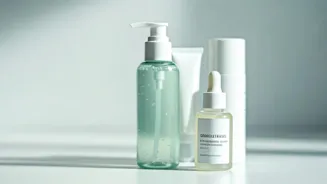Gentle Cleanser
Starting your skincare routine with a gentle cleanser is crucial. Choose a cleanser that is free from harsh chemicals, fragrances, and alcohol. These ingredients
can strip your skin of its natural oils and worsen perioral dermatitis. Opt for cleansers with a neutral pH that effectively remove impurities without causing dryness or irritation. Many dermatologists recommend creamy or lotion-based cleansers for sensitive skin, as they are less likely to disrupt the skin's barrier. Wash your face twice daily – once in the morning and once in the evening – to keep your skin clean and refreshed without over-cleansing, which could lead to more problems. Avoid excessive scrubbing or using hot water; lukewarm water and gentle circular motions are best. Make sure to pat your skin dry with a soft towel rather than rubbing it vigorously to avoid irritation.
Twice Daily Washing
Washing your face twice a day is essential for maintaining cleanliness and removing impurities. In the morning, wash to clear away any overnight oil buildup or remnants of your evening skincare. In the evening, washing is critical for removing makeup, pollutants, and sweat accumulated throughout the day. When washing, always use a gentle cleanser to avoid stripping the skin of its natural oils, which can exacerbate the condition. Employ lukewarm water, as hot water can be overly drying. Pat your skin dry gently with a soft towel, avoiding aggressive rubbing. Regular cleansing helps to keep pores clear and minimizes the chance of irritants triggering or worsening perioral dermatitis. Consistency is key: make washing your face a non-negotiable part of your daily routine.
Avoid Heavy Moisturizers
Selecting the right moisturizer can be tricky with perioral dermatitis, and often, less is more. Thick, heavy moisturizers containing occlusive ingredients like mineral oil or petrolatum can trap irritants against the skin, making symptoms worse. Instead, opt for light, non-comedogenic moisturizers designed for sensitive skin. Look for formulations that include ingredients like hyaluronic acid or ceramides, which help hydrate the skin without clogging pores. These ingredients support the skin's natural barrier function. Consider using a moisturizer sparingly, especially if your skin tends to be oily. If your skin feels extremely dry, apply a thin layer, preferably after cleansing, while the skin is still slightly damp. Always introduce new moisturizers gradually to see how your skin reacts. If a moisturizer seems to exacerbate your symptoms, discontinue its use immediately.
Eliminate Steroid Creams
One of the critical steps in managing perioral dermatitis is avoiding the use of topical steroid creams, unless prescribed and supervised by a dermatologist. While these creams might provide initial relief, they typically worsen the condition in the long run. Steroid creams can thin the skin and increase its sensitivity, leading to flare-ups when the cream is stopped or used inconsistently. It's imperative to stop using these creams abruptly, as abrupt cessation can lead to a rebound effect, causing a severe worsening of your symptoms. A dermatologist should be consulted to determine the best course of action for withdrawal, which usually involves a gradual reduction of the steroid cream under medical supervision. This may be followed by other treatments like topical antibiotics or anti-inflammatory medications to help manage the condition effectively while avoiding long-term complications.
Prioritize Skincare Basics
Simplify your skincare routine by focusing on the fundamentals. The core elements of a healthy regimen include gentle cleansing, adequate moisturizing, and effective sun protection. The use of serums and specialized treatments can be integrated later once the condition is under control and the skin is less inflamed. Choose products that are fragrance-free, hypoallergenic, and non-comedogenic to minimize the risk of irritation or clogged pores. Keep the number of products you use low to make it easier to identify which items might be causing problems. Introduce new products one at a time, observing how your skin reacts to avoid triggering flare-ups. Remember that consistency and patience are essential. Over time, a simple, carefully curated routine will provide the best results for your skin health.
Use Mineral Sunscreen
Protect your skin with a mineral sunscreen, choosing formulas containing zinc oxide or titanium dioxide, which are considered gentle and less likely to irritate sensitive skin. Mineral sunscreens create a physical barrier that reflects the sun's rays. Avoid chemical sunscreens, which are absorbed into the skin and might cause irritation or allergic reactions, potentially worsening perioral dermatitis. Apply sunscreen generously, about fifteen minutes before sun exposure. Reapply every two hours, or more frequently if swimming or sweating. Look for a sunscreen that is fragrance-free and specifically designed for sensitive skin, as it will also support a gentle approach. By shielding your skin from the sun's harmful UV rays, you’ll not only support healing but also reduce inflammation and keep your skin clear.
Avoid Toothpaste Near Skin
Toothpaste, especially those containing fluoride, can be a common trigger for perioral dermatitis due to its irritating ingredients. The fluoride and other chemicals can easily spread from your mouth and irritate the delicate skin around your mouth, leading to redness, inflammation, and other symptoms. Take care to prevent toothpaste from touching the skin around your mouth when brushing your teeth. Rinse thoroughly after brushing to remove any traces of toothpaste that may linger. Consider switching to a toothpaste that is free of sodium lauryl sulfate (SLS) and other harsh chemicals, as these are known irritants. Look for a toothpaste designed for sensitive teeth and gums. If you still experience issues, consult with your dentist for alternative options that are less irritating.
Avoid Makeup Use
When managing perioral dermatitis, it's crucial to avoid or minimize the use of makeup. Makeup products, especially those containing fragrances, preservatives, and other chemicals, can exacerbate the condition. These ingredients may clog pores, cause allergic reactions, and trigger inflammation. If you must wear makeup, opt for hypoallergenic, non-comedogenic products. Always check the ingredient lists and choose items that are specifically formulated for sensitive skin. Remove makeup thoroughly every evening using a gentle cleanser, avoiding harsh rubbing. Consider eliminating foundations, concealers, and other heavy products initially. As your skin improves, you can gradually reintroduce makeup while closely monitoring for any adverse reactions. The goal is to provide your skin with the best environment for healing.
Consider Lifestyle Changes
Making lifestyle changes supports skin healing from the inside out. These include a balanced diet rich in vitamins, minerals, and antioxidants, which can boost your skin's natural healing abilities. Avoiding trigger foods, such as spicy foods and processed foods, can help reduce inflammation. Manage stress levels through practices like meditation, yoga, or deep breathing, as stress can exacerbate skin conditions. Ensure you get enough sleep, as this is a time when your body repairs and regenerates cells. Hydrate by drinking plenty of water throughout the day, promoting healthy skin hydration and flushing out toxins. If possible, avoid smoking and reduce alcohol consumption, as these can have negative effects on the skin. Regular exercise can also improve circulation and promote overall health, supporting clear skin.
Support Skin Internally
Boosting your skin's health from within can also improve recovery. Consider incorporating supplements, such as probiotics, which can support a healthy gut microbiome, potentially reducing inflammation. Also, include essential fatty acids, such as omega-3, found in fish oil or flaxseed oil, can help reduce inflammation and improve skin barrier function. Vitamin D supplements are beneficial, as this vitamin plays a role in skin health and can help reduce inflammation. Always consult with your doctor or a dermatologist before starting any new supplements. They can help determine the right supplements and doses. Alongside topical treatments and skincare routines, internal support contributes significantly to promoting clearer, healthier skin. Remember that the goal is to address the condition from both the outside and the inside.














